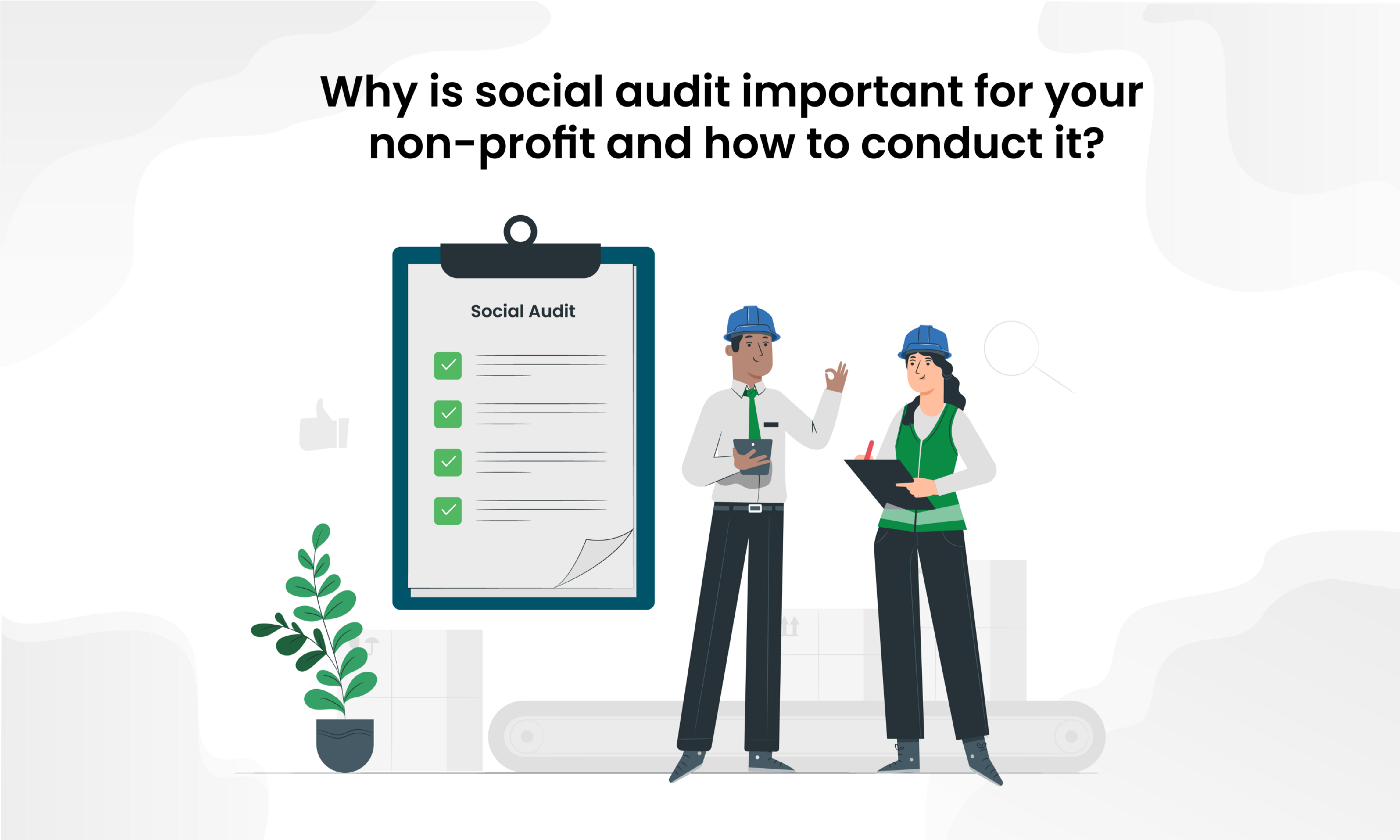Why is social audit important for your non-profit and how to conduct it?

In the world of philanthropy, analyzing finances, crafting reports, and being accountable is a side of the coin that is usually not unveiled. However, it is ironically essential for a non-profit to be ’profitable’ in order to sustain, which means — Calculations around the funds received, funds spent, and the impact generated.
In short, a non-profit has to get its social audit done to plan for its short-term and long-term goals.
Oh, but wait, do you exactly know what a social audit is, and what are the intricacies of such an audit? If not, then you have landed at the right place.
This article has been divided into three parts for better understanding:
- What is a social audit?
- What is the importance of social audit for a non-profit?
- How can non-profits get a social audit done?
So grab a mug of coffee and sit tight for an exciting read coming your way.
What is a social audit?
Social audit is a simple process of analyzing and reporting if an entity is fulfilling its economic, legal, ethical, and philanthropic responsibilities as expected. Once such an audit is done, it can be sliced, diced, and distributed in such a way that all the stakeholders can benefit from it.
The whole process of social audits helps in three significant ways:
- An analysis of what has been done. A social audit report reveals a lot about the functioning of a non-profit in the past.
- The analysis of the past, reveals the growth graph of the future along with pivots, changes, and improvements that need to be undertaken.
- All this enhances the credibility of the non-profit in the eyes of the donors, donees, investors, media, and employees.
Now when you know what precisely a social audit is, it is imperative to know about its importance in-depth.
What is the importance of social audit for a non-profit?
The following are the benefits of doing a social audit for an NGO.
- Competence
A social audit report helps all the stakeholders in analyzing the competence of the NGO and also points out the hurdles or loopholes in its planning and operations.
- Planning
Once the competence of a non-profit is analyzed, the report helps the organization to start making short-term and long-term plans pertaining to its functioning and sustainability.
- Control Structure
Audits are not just about numbers and analysis; they also help organizations in finding corrective measures to rectify specific problems and loopholes.
- Performance
An audit encourages a non-profit to stick to the best of operational standards in order to deliver better with each passing quarter.
- Marketing Benefits
A non-profit can showcase its success stats to its prospective stakeholders by leveraging social media. This not only helps the organization in establishing trust but also build a reputation in the longer run.
- Recognition In The Community
Only the best of NGOs are known to conduct social audits, which means that if an NGO is doing an audit and then publishing it, its stand in the community goes a notch above. This helps an organization to get recognized and awarded for the amazing work that it has been doing.
- Training
An audit report can help the employees in getting trained for the skills that are needed to enhance their productivity and efficiency. This way, they can eventually contribute in improving the audit scores.
This is all from the second segment of the article. However, it is important for you to note that the benefits of social audits are not limited to the pointers given above. There is a lot more that is gained at the organizational level when such a report is curated.
But there is another important segment of this article that is yet to get addressed, and that is -
How can non-profits get a social audit done?

We have divided the complete process of social auditing into three parts:
- Primary Phase
This phase is all about root-level planning and implementation of the audit. The very first step is in this phase is forming a social audit committee. Yes, you read that, right! You cannot involve the whole organization in the auditing process. Hence a team has to be formed from amongst the stakeholders to take charge of the complete auditing process.
- Decision Making
Once this committee is in place, they have to take their very first decision about the methodology that has to be adopted to conduct the audit.
Basically, there are two ways to conduct a social audit:
- Hire a social audit officer. This simply means involving a third-party expert to conduct the whole auditing process and then draft a report. This is done when the organization feels that the process has to be made cleaner, fairer, and more efficient. However, finding the right audit officer and conducting the whole process might be time-consuming and costly.
- Get the audit done by smart technology. With human intelligence and innovative technologies joining hands, there is a smart and efficient solution that is breaking the grounds for conventional methods of auditing — Known as the tech for social good, an NGO can leverage the Karma Engine by Billion Lives to conduct an end-to-end audit and garner accountability and compliance, progress validation and real-time data by geo-targeting. This actually means technology is there to help organizations, 24*7, without making them wait for long process audits and reports.
- Audit Distribution
Once the method of auditing is selected and the audit is conducted; it is important for an organization to distribute the report to its stakeholders to work on subjects like accountability and sustainability.
This is a broad level analysis of how an audit should be done.
In the current scenario of the donor — donee ecosystem, it is essential for a non-profit to realize the value of data, audits, and reports.
With numerous NGOs shutting down every year and thousands of causes being crushed under the pressure of sustainability, there is nothing better than identifying what is working and what is not and then rectifying it for the benefit of all.
Because in the end, “True philanthropy requires a disruptive mindset, innovative thinking and a philosophy driven by entrepreneurial insights and creative opportunities.”
Learn more about the BillionLives Social Auditing solution today!



